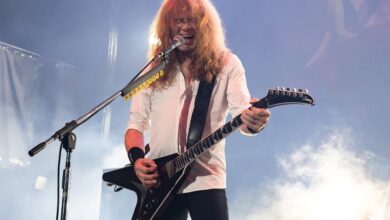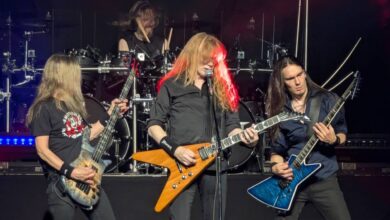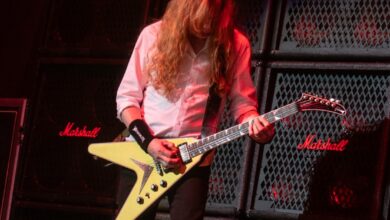Metallica’s “Orion” Shines in Atlanta: A Triumphant Tribute to Cliff Burton on June 3, 2025
On the night of June 3, 2025, Metallica gave Atlanta a concert experience that went far beyond the expected. Performing at the sold-out Mercedes-Benz Stadium, the band unleashed a thunderous set filled with power and precision. But among all the distortion, fire, and crowd roars, one song stood out with a rare emotional weight: “Orion.” This instrumental epic, pulled from the revered Master of Puppets album, was more than just a song—it was a living tribute to the spirit of the late Cliff Burton. And in Atlanta, the tribute felt especially heartfelt, timeless, and unforgettable.
Roger that familiar low-end rumble—it was the echo of Cliff Burton’s voice without words. Burton, who died tragically in 1986 at only 24, remains a mythical figure in Metallica’s history. He wasn’t just their bassist; he was a musical architect, blending Bach-like melodies into brutal thrash. “Orion” was largely his composition, and when Metallica plays it live today, it’s a direct line back to his soul. That’s exactly how it felt in Atlanta: not like a band revisiting a song, but like a reunion with a fallen brother.
The choice to perform “Orion” that night was no accident. James Hetfield introduced the song with a solemn nod to Burton, while stadium screens lit up with archival footage of Cliff in action—long hair flying, fingers dancing across the fretboard. The atmosphere shifted from raucous to reverent. Fans knew they were witnessing something rare. Metallica doesn’t perform “Orion” often, and when they do, it’s with purpose. This was a tribute, a ritual, and a form of remembrance.
Kirk Hammett and Robert Trujillo anchored the song with deep concentration. Trujillo, Burton’s spiritual successor, delivered the iconic bass passages with immense respect—never copying, but channeling. His reverence was evident in every note. Behind them, Lars Ulrich and Hetfield kept the groove tight and thunderous, letting the instrumental sections breathe and swell. The audience stood in silence at first, then erupted into cheers when the song reached its climactic, melodic bridge—a sequence that felt almost symphonic in its grandeur.
What makes “Orion” so powerful live is that it’s completely wordless, yet universally understood. In Atlanta, 70,000 fans didn’t need lyrics to feel the emotion. The song’s rising and falling sections mimic life itself—peaceful, chaotic, majestic, and tragic. Cliff Burton’s fingerprints are all over that sonic arc. The crowd swayed not to a beat, but to a feeling—something between pride, sorrow, and gratitude.
Metallica has played “Orion” in only a select number of shows since Cliff’s death. One of the most iconic was in 2006 at their Rock and Roll Hall of Fame induction, and another during the 30th anniversary shows in San Francisco. But the Atlanta 2025 performance felt particularly significant. Coming during the M72 World Tour, which already celebrated their history with deep-cut setlists and rotating songs, “Orion” represented more than nostalgia. It was a call back to their roots and a salute to their eternal brotherhood.
The set that night also featured new material from 72 Seasons alongside classics like “One,” “Seek & Destroy,” and “Master of Puppets.” Yet “Orion” stood alone in tone and intention. It brought contrast. In a show built on aggression, fire, and muscle, “Orion” was introspection—it paused the machine and let humanity speak. The fact that Metallica can offer both is a testament to their complexity as musicians and their sincerity as artists.
Cliff Burton’s influence on Metallica wasn’t limited to one song. He shaped their early direction, pushed their harmonic boundaries, and introduced them to classical scales and progressions. “Orion” was the pinnacle of that vision. When Metallica performs it today, they’re not just honoring a friend—they’re honoring a cornerstone of their identity. In Atlanta, that sense of grounding was palpable.
Fans from across the country flew in for the show, some holding banners dedicated to Burton, others wearing vintage Master of Puppets tour shirts. During “Orion,” the entire stadium became a kind of cathedral. People sang along not with their voices, but with their expressions, their body language, their silence. You could see the tears in the front rows, the closed eyes, the shared knowing that this wasn’t just music. It was memory made audible.
The show’s design also helped amplify the emotional resonance. The Snake Pit stage layout brought fans close to the band, creating an intimacy that’s rare in massive stadium shows. During “Orion,” the band performed facing inward, drawing energy not from pyro or screens, but from each other. It was a quiet communion. It was as if, for a moment, Atlanta disappeared and only four men and a memory remained.
Robert Trujillo has always embraced the challenge and responsibility of honoring Burton’s legacy. That night, his performance felt especially personal. He stood where Cliff might have stood and let the music speak for both of them. It was never an imitation—it was communion. The transitions, the melodies, the pauses all felt like sacred ground. The crowd, in turn, gave him full respect. They knew they were seeing something fragile and powerful.
Atlanta’s concert was more than just another stop on the M72 tour. It felt like a turning point. Metallica, decades into their career, proved that they’re not just surviving—they’re evolving, still finding new ways to honor the past while pushing forward. “Orion” served as the night’s soul, grounding the chaos in something pure. And for those in attendance, it may very well have been the emotional highlight of the entire tour.
The performance of “Orion” also reminded fans why instrumentals matter. In a world dominated by lyrics and slogans, “Orion” communicates through feeling alone. It challenges the audience to listen with their hearts, not their ears. That challenge was accepted in Atlanta. Everyone there understood, without explanation, that this was sacred ground.
As the final notes of “Orion” faded into the Georgia night, a moment of silence hovered before the band plunged into “Battery.” It was almost jarring—like waking from a dream. But that’s what “Orion” does. It slows time, shifts the temperature, and then hands you back to reality a little heavier than before. Metallica knows this, and they wield it wisely.
Sixty thousand people left the stadium that night knowing they’d witnessed more than a concert. They’d experienced a ceremony—a celebration of life, loss, music, and memory. “Orion,” in all its instrumental brilliance, reminded everyone that the most meaningful messages don’t always need words. Sometimes, all it takes is a melody, a memory, and a moment shared in the dark.





